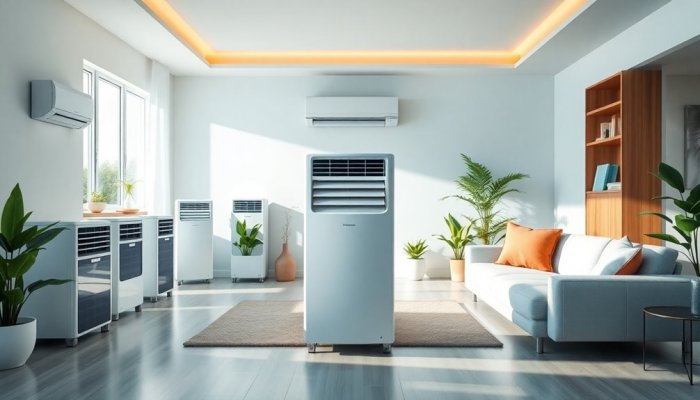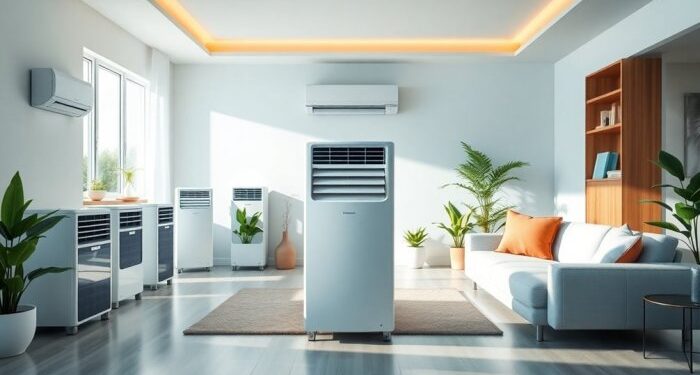When it comes to selecting the perfect air conditioner for humid climates, there are crucial factors to consider. This guide will walk you through everything you need to know, from size considerations to maintenance requirements, ensuring you make the best choice for your comfort.
Exploring the world of air conditioners tailored for humid environments can be overwhelming, but with the right information, you can navigate this decision with confidence.
Factors to Consider

When choosing an air conditioner for humid climates, there are several important factors to consider to ensure optimal performance and efficiency.
Room Size
The size of the room plays a crucial role in determining the type and capacity of the air conditioner needed. A small air conditioner may struggle to cool a large room effectively, while an oversized unit can lead to inefficient operation and higher energy costs.
It is essential to accurately measure the square footage of the room and consult with a professional to determine the appropriate size of the air conditioner for optimal cooling in humid conditions.
Energy Efficiency Ratings
Energy efficiency ratings, such as SEER (Seasonal Energy Efficiency Ratio) and EER (Energy Efficiency Ratio), are crucial considerations when selecting an air conditioner for humid climates. Higher SEER and EER ratings indicate greater energy efficiency, resulting in lower energy consumption and reduced operating costs over time.
Choosing an air conditioner with high energy efficiency ratings not only benefits the environment but also saves money in the long run.
Types of Air Conditioners
There are various types of air conditioners suitable for humid climates, each with its own advantages and considerations. Ductless mini-split systems offer flexibility in cooling individual rooms or zones, while portable units provide convenient spot cooling options. Central air conditioning systems are ideal for whole-house cooling and can effectively dehumidify indoor spaces.
It is essential to evaluate the specific needs of your space and consider factors such as installation requirements, maintenance, and overall efficiency when choosing the right type of air conditioner for humid climates.
Dehumidifying Features
Air conditioners with built-in dehumidifiers are particularly beneficial in humid climates as they help reduce the moisture content in the air, making indoor spaces more comfortable and less prone to mold and mildew growth. This feature not only enhances the cooling efficiency of the air conditioner but also improves overall indoor air quality.
Advanced Dehumidification Technologies
- Variable Speed Compressors: These compressors adjust the cooling output based on the humidity levels, allowing for more precise control over dehumidification.
- Hybrid Dehumidification Systems: These systems combine traditional refrigeration-based dehumidification with desiccant-based dehumidification for optimal moisture removal.
- Smart Sensors: Air conditioners equipped with smart sensors can detect humidity levels and adjust dehumidification settings automatically for maximum comfort.
Impact on Indoor Air Quality and Comfort
Dehumidification not only helps in reducing moisture levels but also plays a crucial role in improving indoor air quality by preventing the growth of mold, mildew, and dust mites. By maintaining the right humidity levels, air conditioners with dehumidifying features can create a healthier and more comfortable indoor environment for occupants.
Maintenance Requirements
Regular maintenance is essential to ensure that your air conditioner operates efficiently in a humid climate. Neglecting maintenance can lead to issues such as mold and mildew growth, which can affect indoor air quality and the overall performance of your AC unit.
Here are some maintenance tasks to keep in mind:
Importance of Regular Cleaning and Servicing
- Regularly clean or replace air filters to prevent dust and debris buildup, which can restrict airflow and decrease efficiency.
- Inspect and clean evaporator and condenser coils to ensure optimal heat transfer and prevent mold and mildew growth.
- Check and clean the drainage system to prevent clogs that can lead to water leakage or excess humidity.
- Inspect and tighten electrical connections to prevent overheating and potential fire hazards.
- Schedule annual professional servicing to check for refrigerant leaks, adjust refrigerant levels, and ensure overall system performance.
Tips for Troubleshooting Common Issues
- If your air conditioner is not cooling efficiently, check for dirty air filters or clogged coils, and clean or replace them as needed.
- If you notice water leaks or excess moisture around the unit, check the drainage system for clogs and ensure proper drainage flow.
- If the AC unit is making unusual noises, inspect the fan blades for debris or obstructions, and clean or adjust as necessary.
- If your air conditioner is constantly cycling on and off, check the thermostat settings and ensure proper temperature calibration.
- If you encounter any issues beyond basic troubleshooting, seek professional help to prevent further damage and ensure proper repairs.
Installation Considerations
Proper installation is crucial to ensure the optimal performance of an air conditioner in a humid climate. It not only affects the efficiency of the unit but also plays a significant role in maintaining a comfortable indoor environment.
Importance of Insulation and Sealing Gaps
Insulation and sealing gaps are essential during the installation process as they help prevent warm, humid air from entering the living space. Proper insulation ensures that the cool air produced by the air conditioner stays inside, maintaining a consistent temperature.
Sealing gaps around doors, windows, and other openings also helps in reducing energy wastage and improving overall efficiency.
Proper Sizing of the Air Conditioner
Choosing the right size of the air conditioner is crucial for it to function effectively in a humid climate. An undersized unit will struggle to cool the space adequately, leading to excess humidity, while an oversized unit may cool the air too quickly without effectively removing moisture.
Proper sizing ensures that the air conditioner can efficiently dehumidify the air while cooling it to a comfortable level.
Positioning for Maximum Effectiveness
Positioning the air conditioner correctly is key to maximizing its effectiveness and efficiency. It is recommended to install the unit away from heat sources, direct sunlight, and areas with high humidity levels. Placing the air conditioner in a central location allows for even distribution of cool air throughout the room.
Additionally, ensuring proper airflow around the unit and keeping the filters clean can help maintain optimal performance.
Last Recap
In conclusion, choosing the right air conditioner for humid climates is a decision that impacts your daily comfort and well-being. By understanding the factors discussed, you can make an informed choice that keeps you cool and content in even the stickiest of weather.
FAQ Guide
How important is the size of the room when choosing an air conditioner for humid climates?
Room size is crucial as it determines the cooling capacity needed for effective performance in humid conditions.
What are the benefits of air conditioners with built-in dehumidifiers for humid climates?
These units help reduce excess moisture in the air, enhancing comfort and improving indoor air quality.
Why is regular cleaning and servicing essential for air conditioners in humid climates?
Regular maintenance prevents mold and mildew growth, ensuring efficient operation and longevity of the unit.
How does proper installation impact the performance of an air conditioner in humid climates?
Correct installation ensures optimal efficiency, preventing issues like air leaks and inadequate cooling.



